[ad_1]
In the middle of an unrelenting Los Angeles heat wave, potter Daniel Dooreck greeted his neighbors as they said hello from the sidewalk in front of his single-car-garage pottery studio in Echo Park.
It may seem like an unusual place for a pottery studio, but Dooreck’s professional life as an L.A. potter began in an unusual way — as a social media experiment on Instagram.
“I had 30 vases sitting in my garage, and I decided to throw them up on my personal Instagram account,” Dooreck said of the vessels he made while stuck at home with COVID-19. “I sold $3,000 worth of pottery in half a day.”
He ended up spending $700 to ship the vases because he didn’t know what he was doing at the start of his new business. At the time, Dooreck, a noted sommelier, managed a beverage program at the Hoxton Hotel in downtown Los Angeles.
He had no idea that his inaugural Instagram sale would launch him on a career path that would give him the freedom he had long wished for. “I have had a lot of random shifts since I left college,” the 29-year-old explained last week at his Echo Park studio. “They all revolve around a central idea: being autonomous and working for myself.”
Originally from New York, Dooreck graduated from McGill University in Montreal with a degree in kinesiology, only to realize upon graduation that he wasn’t interested in medicine.
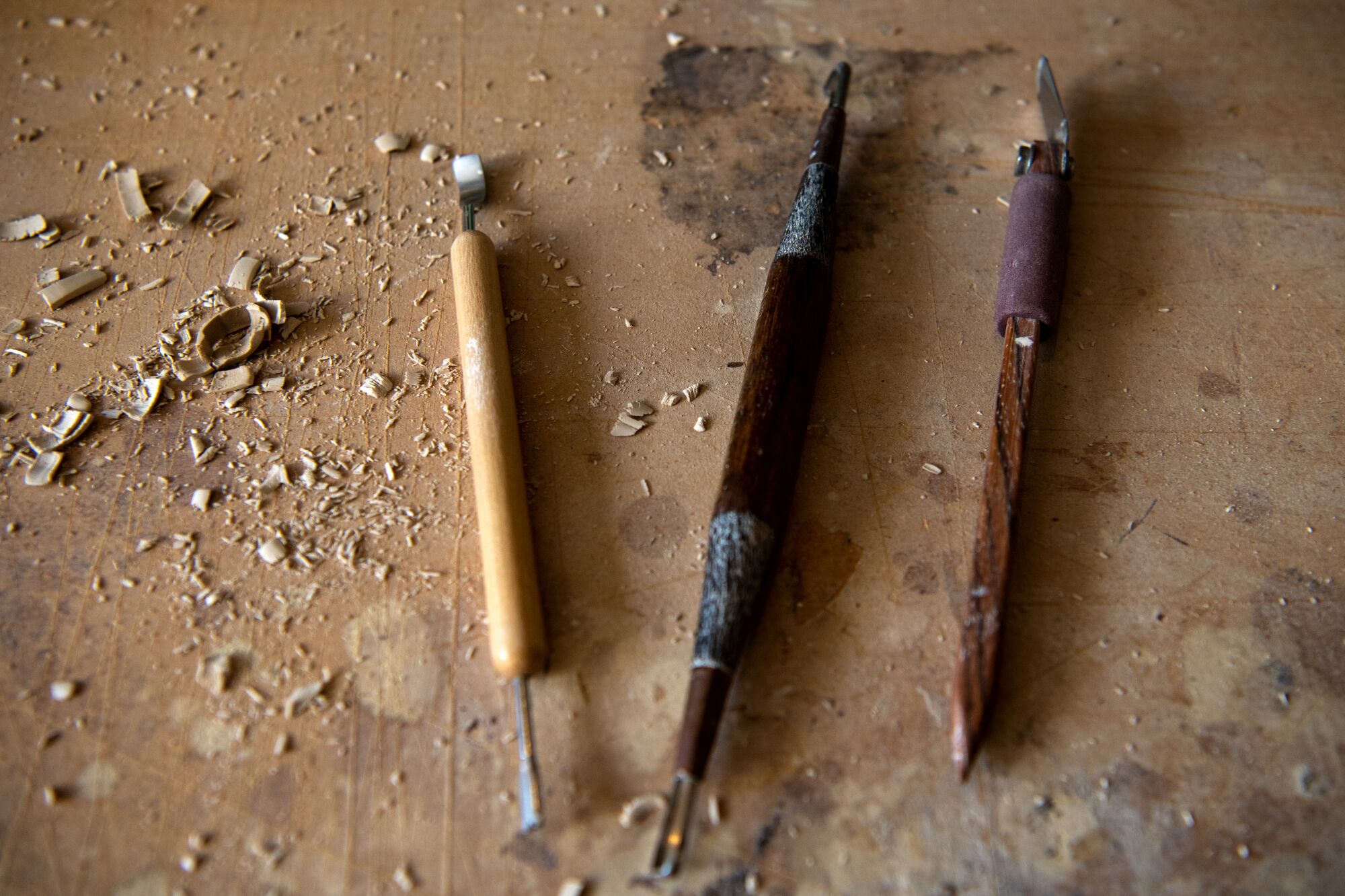
Details of clay shavings and pottery tools inside Daniel Dooreck’s ceramics studio.
(Mariah Tauger / Los Angeles Times)
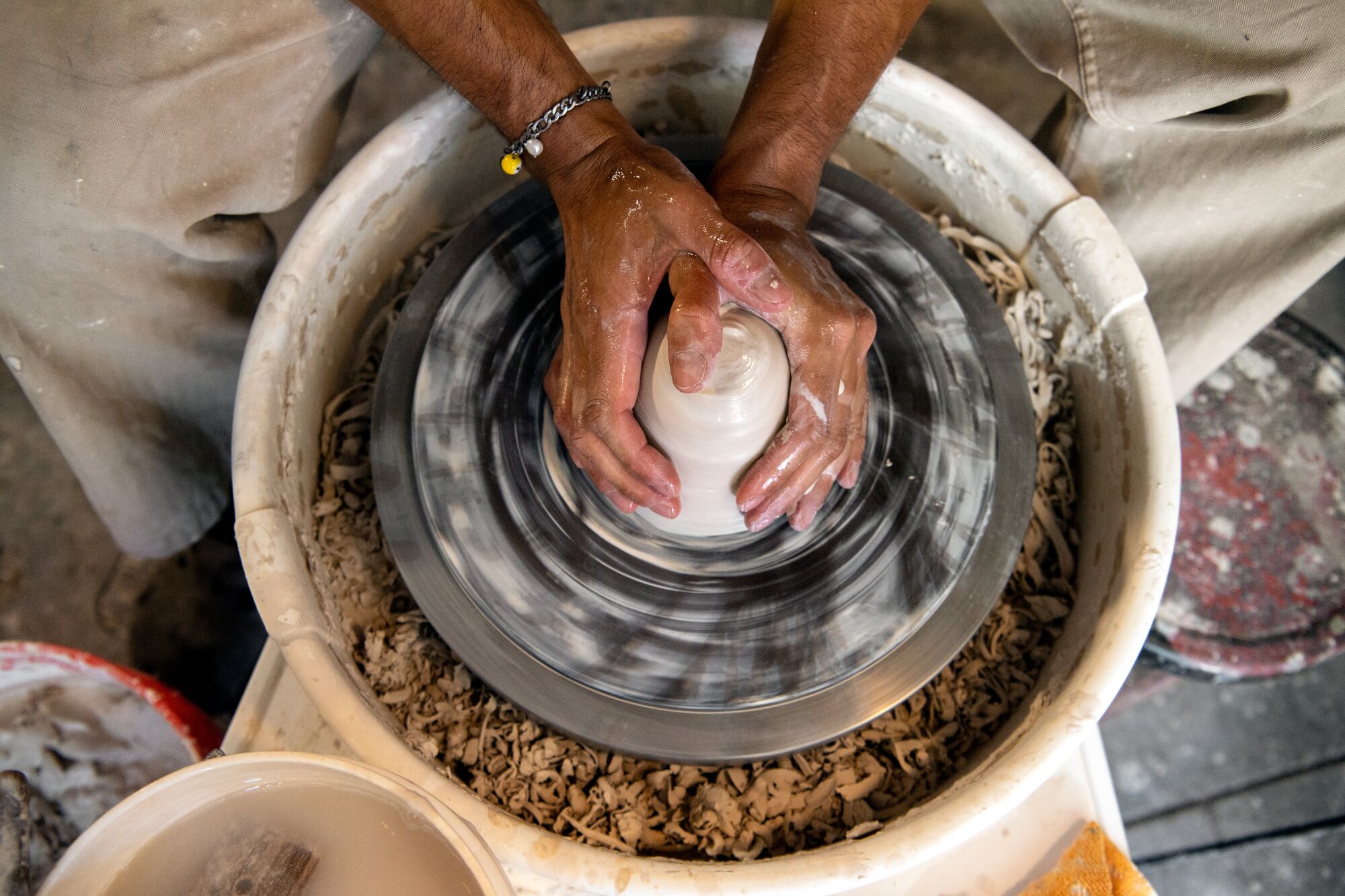
Daniel Dooreck throws a vase in a one-car garage below his apartment complex in Echo Park.
(Mariah Tauger / Los Angeles Times)
During college, he worked as a line cook at various restaurants, including Momofuku, and became fascinated with wine. In 2019, he represented Canada at the prestigious Chaine des Rotisseurs Jeune Sommelier Competition in Seoul, South Korea, before becoming a part-owner of the neighborhood restaurant Taverne Bernhardts in Toronto.
At 24, he joined a pottery studio for fun. “It was $200 a month,” Dooreck recalled. “That seemed like a lot of money at the time.” He had no experience with pottery but taught himself how to throw vases and was soon spending several hours a week at the studio while working full-time at the restaurant.
After selling his partnership in the restaurant in 2021, he moved to Los Angeles, not far from Santa Barbara where his mother, who is originally from China, and his father, who is a second-generation native of Brooklyn, N.Y., live. In L.A., Dooreck worked for a period as a sommelier at République and “sold $5,000 bottles of wine.”
Like kinesiology, however, he was uninspired by restaurant work.
“It was soulless,” he said.
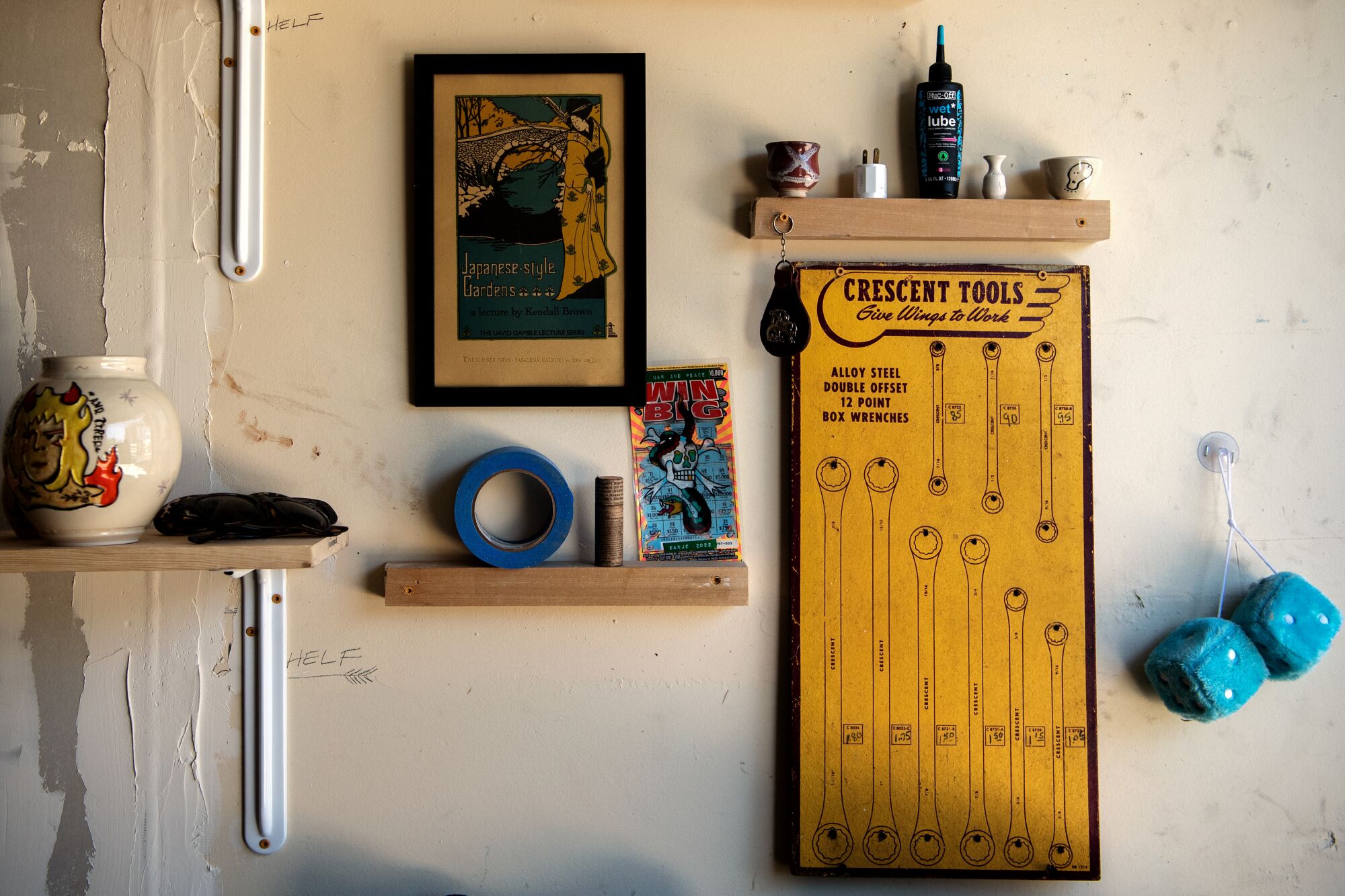
Inside Daniel Dooreck ceramics studio. Personal touches and quirky details inject energy into an otherwise utilitarian space.
(Mariah Tauger / Los Angeles Times)
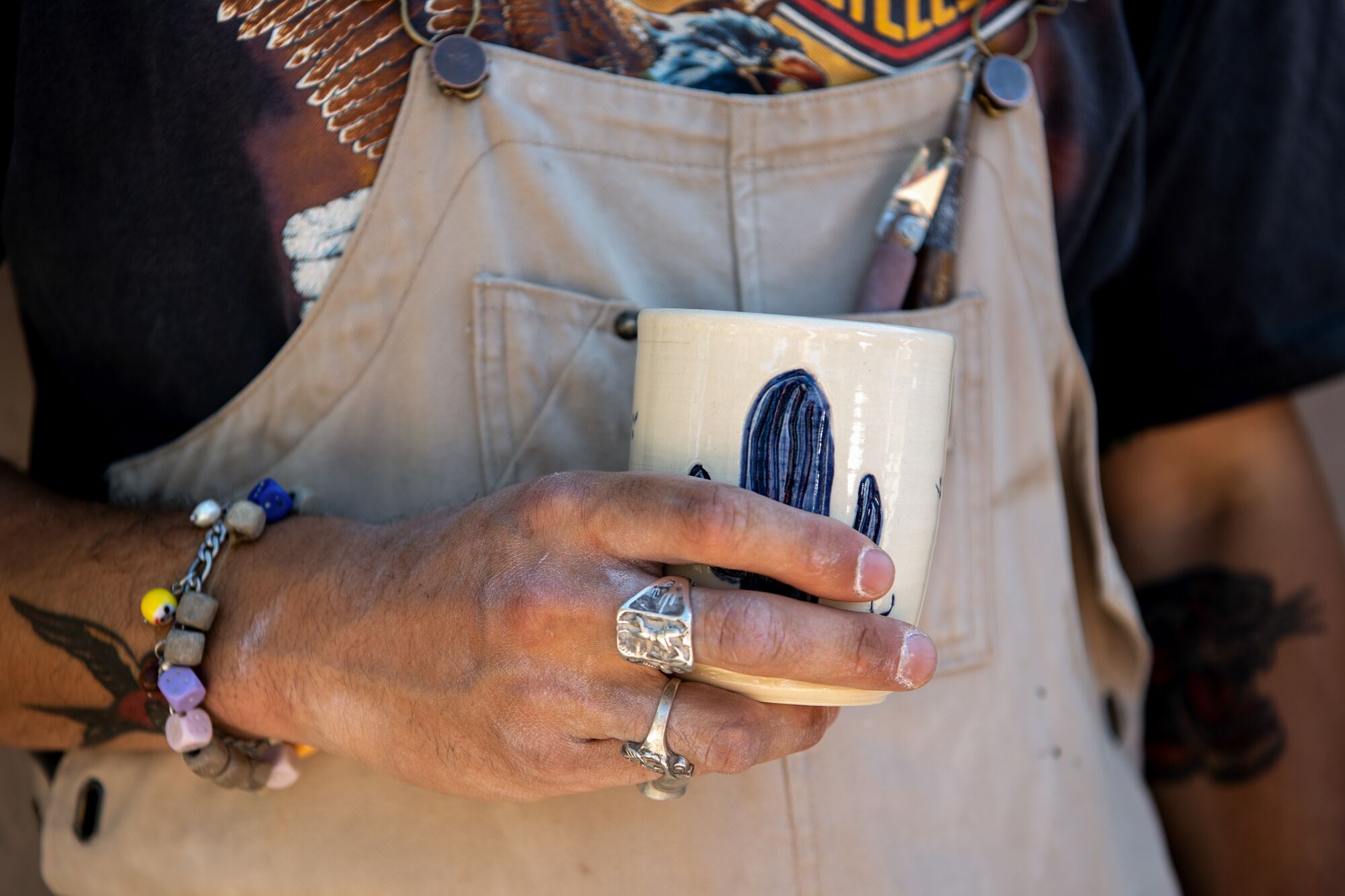
Daniel Dooreck uses the vintage cowboy ring he found on Etsy, showcased here, as his stamp on the bottom of his pieces.
(Mariah Tauger / Los Angeles Times)
Following his surprising Instagram sale success, Dooreck quit his downtown L.A. hotel job in 2022 and spent two weeks in Mexico City where he created a business plan. With the help of a friend, he made a website, logo and branding, and when he returned to Los Angeles, he set up Danny D’s Mudshop in his Echo Park garage.
“Turning mud into really nice ceramics” in his garage may be his deadpan slogan, but on a recent visit, Dooreck was all business as he finished an order for a new Mexican restaurant in Washington, D.C.
As Dooreck wanders through side-by-side garages, outfitted in dusty SnowPeak overalls, suede Birkenstock clogs and the vintage silver cowboy ring he uses to stamp his pottery, he demonstrates what it’s like to own his own business.
“It’s a laborious process,” he said as he sat down and threw a vase at his potter’s wheel. “It takes three days to create one piece, including throwing, drying, carving and painting.” Dooreck is also in charge of marketing, production and fulfillment. He recently started a newsletter and has sold hundreds of T-shirts and totes, which he stores in bins below the cardboard boxes he has on hand for shipping. “People like merch,” he said with a shrug.
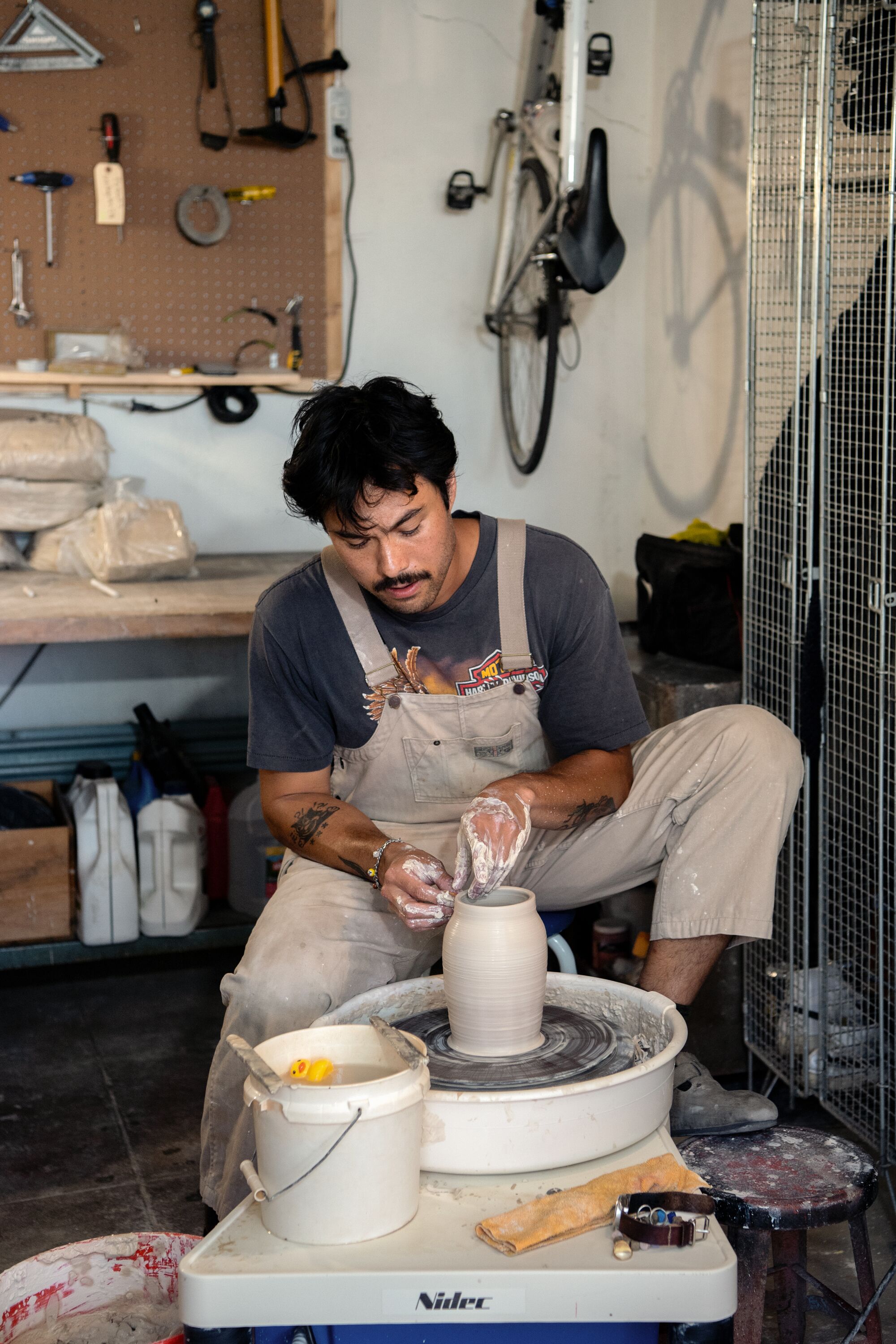
“I’m trying to grow my business into something sustainable,” Dooreck said.
(Mariah Tauger / Los Angeles Times)
From the busy street, neighbors see a humble studio filled with pottery, bikes, quirky artworks and industrial furniture, including a vintage bench seat from the cab of a 1981 pickup truck. But they also see an inspiring success story: a restaurateur and sommelier who became a potter because he wasn’t happy.
“I joke that I left my 40-hours-a-week job to work 90 hours a week doing something I love,” Dooreck said as he etched a Hot Stuff magazine-inspired devil tattoo on a vase. “I devoted my 20s to food and wine,” he added, “but I wasn’t happy.”
Paired with Dooreck’s approachable, unpretentious nature and million-watt smile, it’s easy to understand why the potter has been featured in photo shoots with fashion brands such as Huckberry, Mr. Porter, Fuggiamo, Converse and Blundstone. (Dooreck has an agent for commercial work but not for his pottery.) “I think people see that I’m a potter and think, ‘He must be nice,’” Dooreck said of his 113,000 Instagram followers.
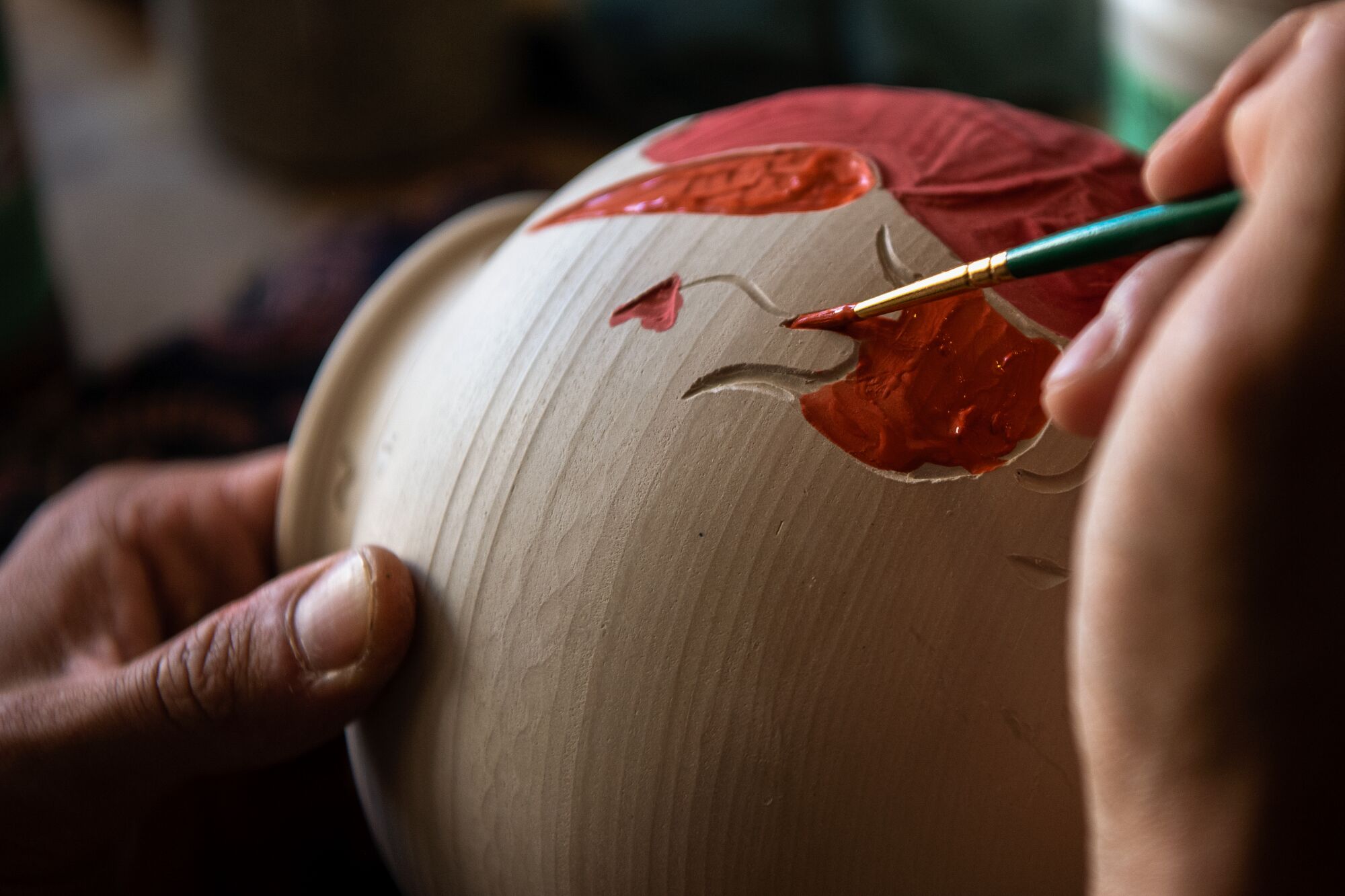
Daniel Dooreck paints a carved devil tattoo illustration based on Hot Stuff magazine.
(Mariah Tauger / Los Angeles Times)
Although he has always been a hobbyist, Dooreck didn’t know much about painting or pottery before launching his pottery studio. He resists being called an “artist” because he says he is not a painter or an illustrator. Also, when it comes to his love of western art, which is inspired by L.A., he notes that he did not grow up watching westerns and doesn’t even know how to ride a horse. Yet he has struggled to keep his textural hand-thrown pots, vases and copitas engraved with cowboy boots, snakes and cactus motifs in stock.
Dooreck’s work resonates, particularly with younger customers, said his friend, author Jedidiah Jenkins, because it reflects the maker.
“What sets Daniel apart is his curiosity and bravado,” Jenkins said in an email. “There’s something about him that says, ‘Why not me? Why shouldn’t I try?’ I think, coming from the restaurant world, a culture familiar with fast failure, he has developed a thick skin and the belief that it’s better to try than just dream. And he’s an incredibly hard worker. I’ve noticed that he understands the importance of a story in a product. It’s not just clever pottery; it’s him, infused in each piece. His eccentric taste and eye. His smile. The man that orders for the table and knows the best wine and orders three bottles, that’s the same guy who’s making your vase and cracking himself up.”
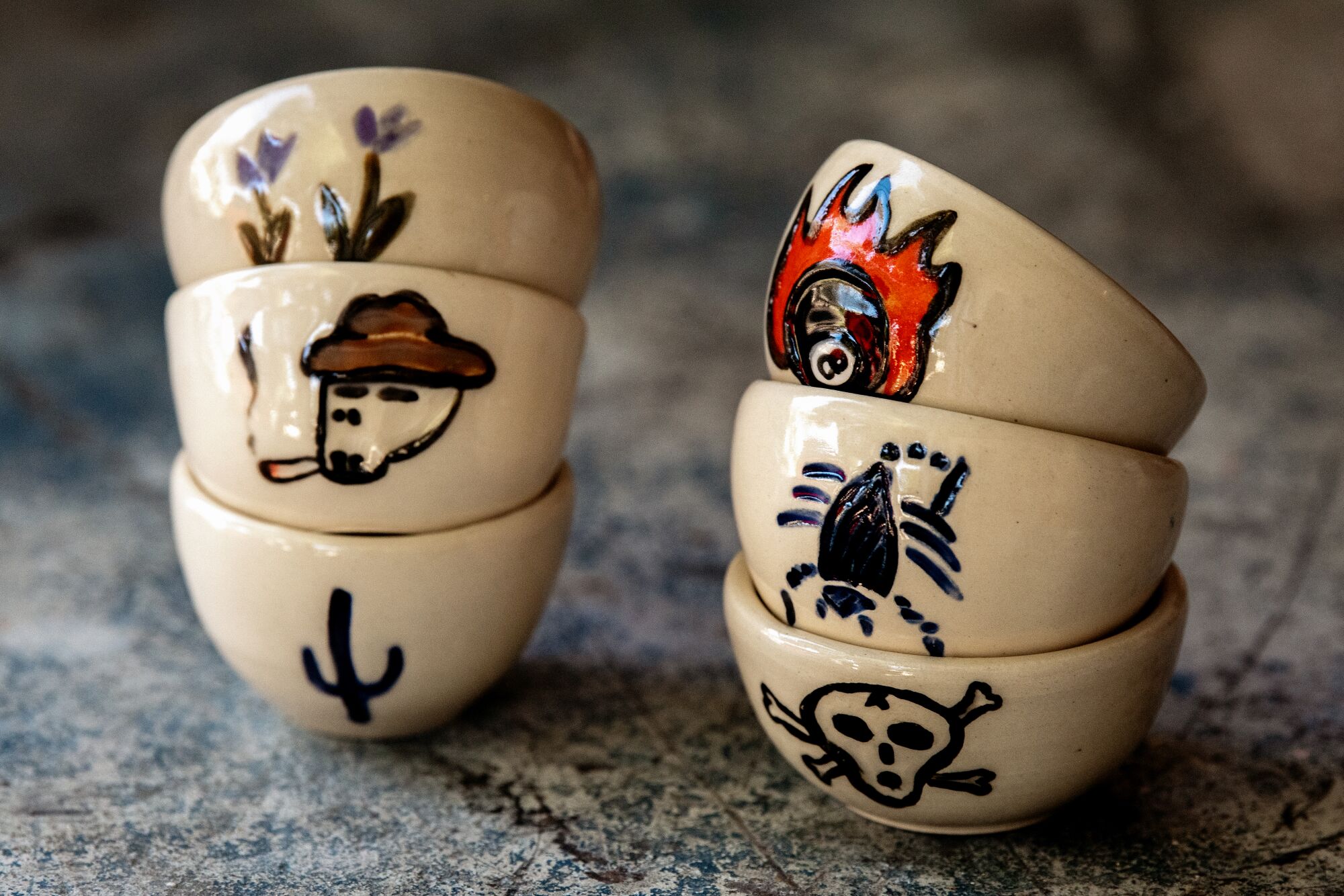
Copita glasses, $37, can be used for mezcal or salt.
(Mariah Tauger / Los Angeles Times)
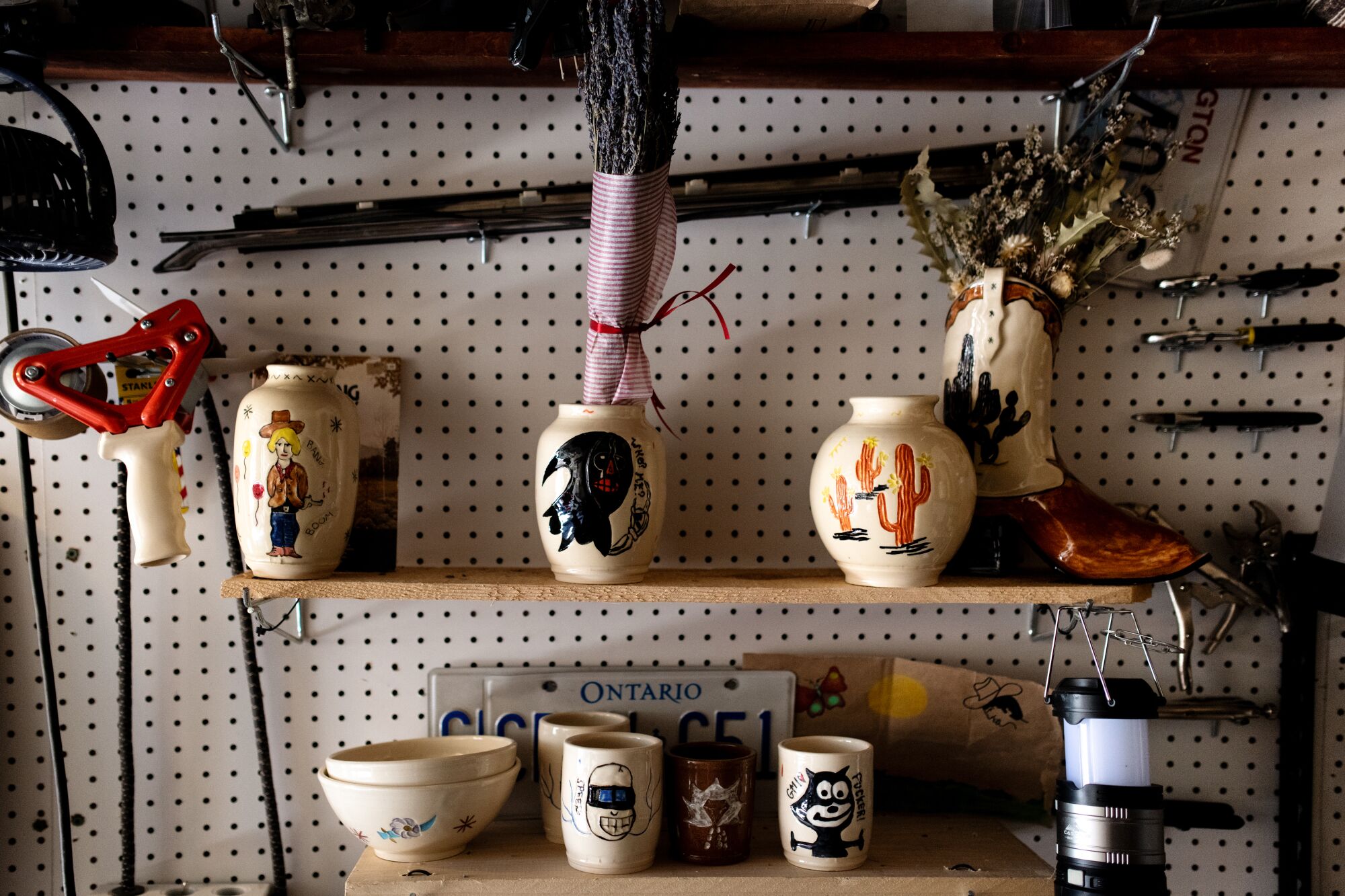
Dooreck’s work ranges from about $15 to $30 for a tiny copita glass to $450-$700 for a vase.
(Mariah Tauger / Los Angeles Times)
When he first started making pottery five years ago, Dooreck gravitated toward sculptural vases with thin necks. Today, he is more focused on smaller goods that can be shipped easily such as copita glasses used for mezcal or salt, tumblers, ashtrays and wine glasses, which he produces simultaneously by throwing off the hump.
At a time when buying locally sourced goods matters to consumers, especially in L.A., Dooreck’s hand-thrown vessels have landed in shops and restaurants worldwide in addition to his website. In just a year, he has more than 20 wholesale clients and employs two people part-time to help him with throwing and shipping. Dooreck’s work, which ranges from about $30 for copitas to $700 for vases, balances the craft of pottery with the accessibility of flash tattoos and vintage American West art.
Despite his success in Echo Park, Dooreck is ready to move on.
“I feel like a part of the community in Echo Park,” he said of his neighbors, whom he has immortalized on Instagram and TikTok. “But I’m outgrowing this space. It’s great to interact with people, but I need to put my head down and focus. I need four more of me.”
Ideally Dooreck would like to move to a commercial studio where he can have a kiln, hire a few production potters to help him with his wholesale clients and host Color Me Mine-style carving workshops.
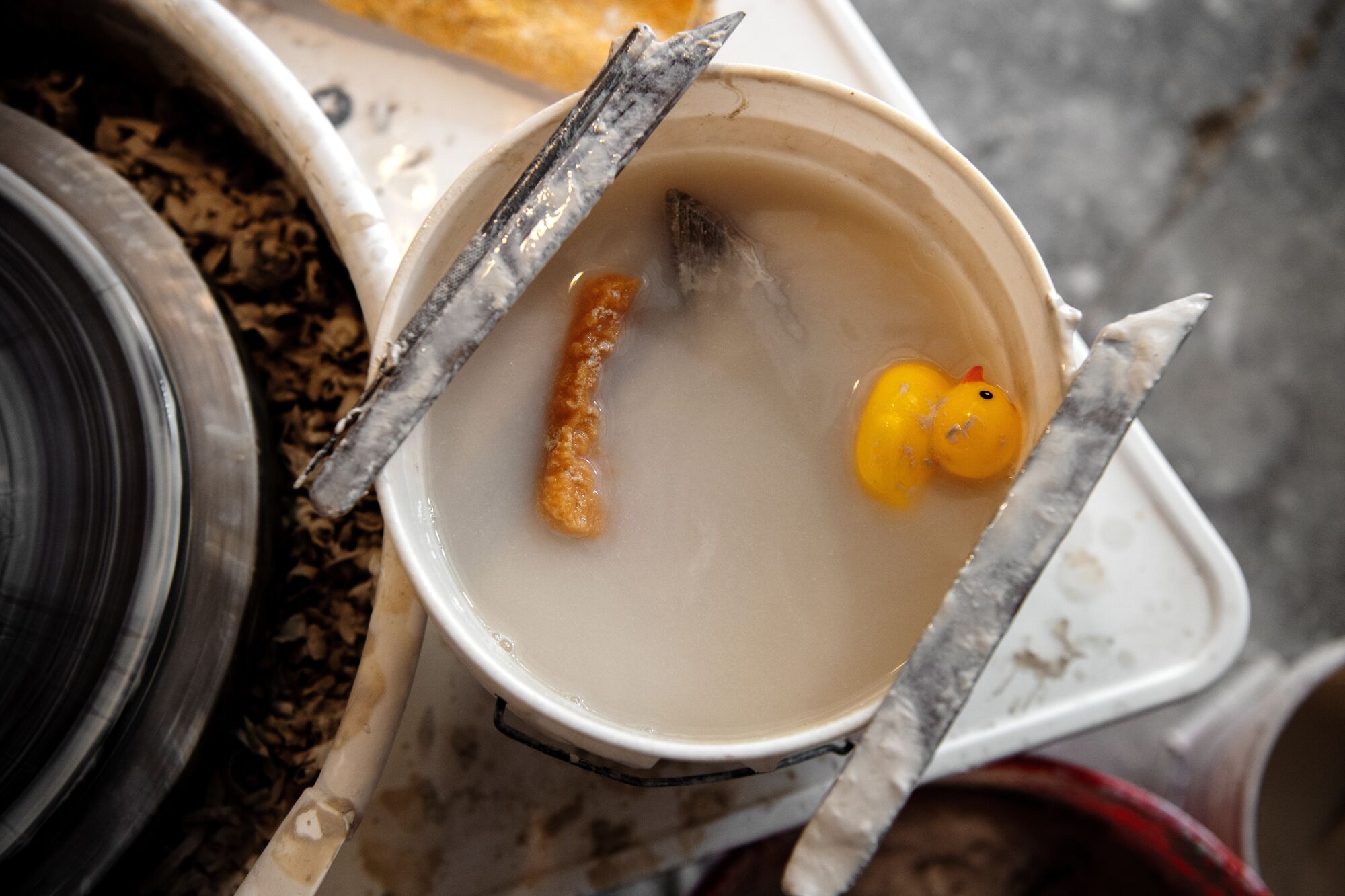
A floating rubber duck next to the potter’s wheel offers a glimpse into Dooreck’s fun and playful personality.
(Mariah Tauger / Los Angeles Times)
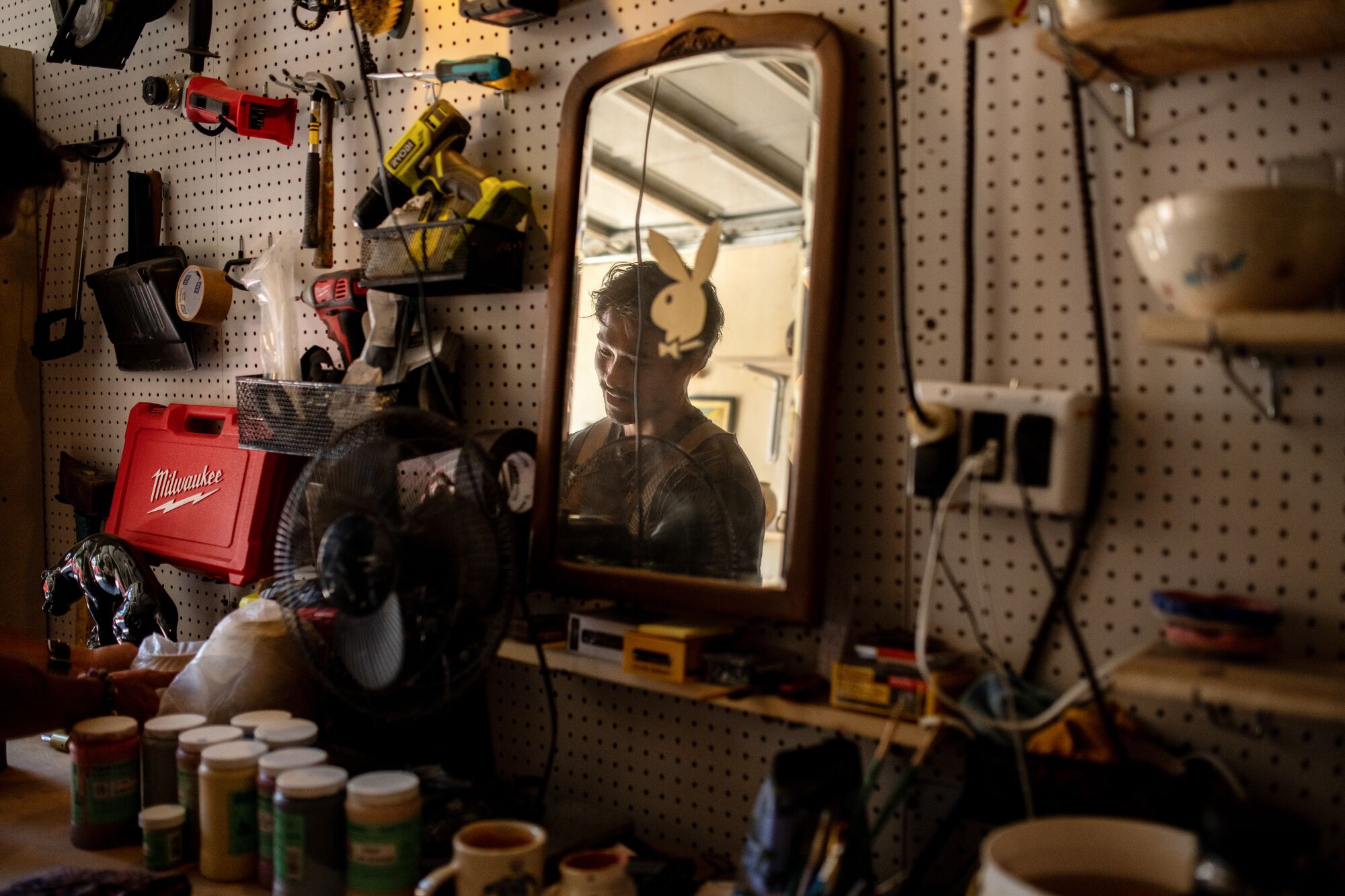
Daniel Dooreck paints one of his hand-carved pieces inside his ceramics studio.
(Mariah Tauger / Los Angeles Times)
He hopes that what he has learned in his garage studio — how to manage a business by himself (he goes to Modo Yoga three times a week to help with the physical demands of throwing) and still make time for travel and camping — are tools for a sustainable business.
But ultimately the best part of launching Danny D’s Mudshop has been the people he has met, he said.
“I get tagged five times a day from people all over the world on Instagram,” Dooreck said. “When I wake up in the morning, I feel very fulfilled.”
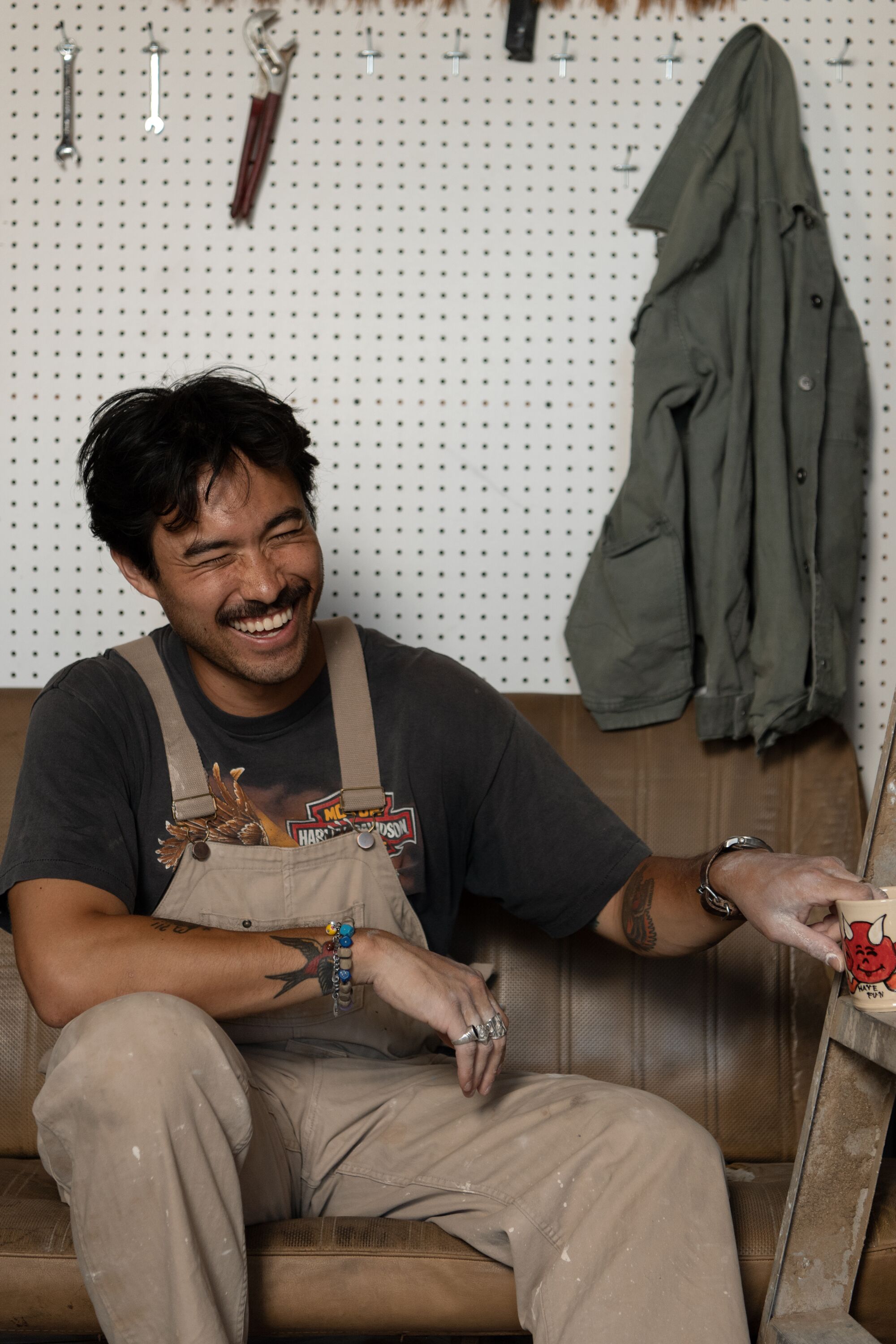
“My favorite part about Danny D’s Mudshop? Meeting people,” Dooreck said. “I feel part of the community in Echo Park.”
(Mariah Tauger / Los Angeles Times)
[ad_2]
Source link